How to Improve Your Dental Hygiene in 5 Easy Steps
Healthy teeth are the key to having a healthy body. Plus, it’s one of the first things people notice about us. That’s why good dental hygiene should be a crucial priority for everyone.
Our teeth also help us to chew and speak clearly. They keep our faces symmetrical and looking their best. And, importantly, how we feel about our smile greatly impacts our self-esteem. Good oral health care helps prevent embarrassing bad breath, keeps tooth decay and gum disease at bay and helps us keep our teeth as we age.
You might be thinking that you brush your teeth twice a day – isn’t that enough? But there’s a lot more to consider when it comes to keeping our teeth and gums healthy with good oral hygiene.
How to have better dental hygiene in 5 steps
- Brush your teeth twice a day
- Use fluoride toothpaste
- Don’t forget to floss
- Drink plenty of water
- Visit your dentist regularly
While the steps are straightforward, following a consistent oral hygiene routine will help prevent tartar, or hardened plaque, from forming on your teeth. Without regular dental cleanings and an effective oral hygiene routine, plaque combines with minerals from saliva and turns into tartar. This stains the teeth and can not simply be brushed away.
Here’s what you need to know about each dental hygiene step…
Step 1: Brush teeth twice a day
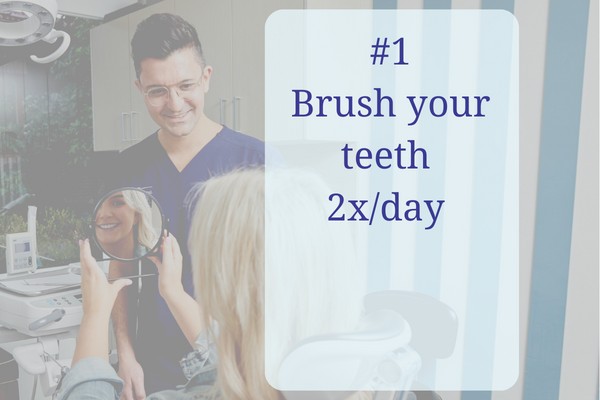
Tips for brushing your teeth correctly include:
- Never skip brushing your teeth in the morning and before bed.
- Consider your toothbrushing technique. Take care along the gum line and use a gentle, circular motion.
- Don’t forget to brush your tongue. Use your toothbrush to gently stroke the tongue from back to front.
- It doesn’t matter whether you use an electric or manual toothbrush. Your technique is the most important factor in keeping your teeth and gums healthy.
Step 2: Use toothpaste with fluoride
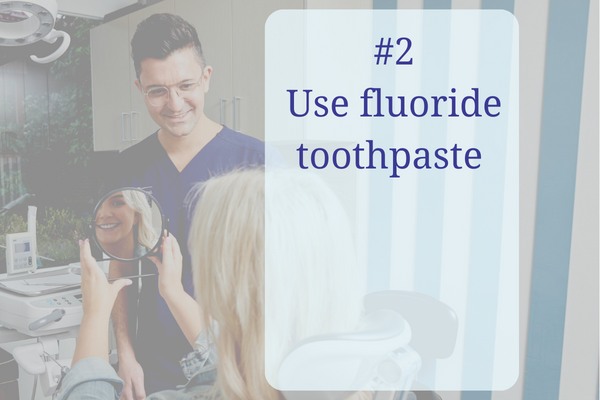
You may have heard some controversial arguments about the use of fluoride in the media. However, fluoride is a naturally occurring mineral that exists in almost all water sources to some extent. The Australian Dental Association recommends its use due to its ability to prevent tooth decay by making tooth enamel stronger.
Most dentists also recommend that you don’t rinse your mouth after brushing, as fluoride left behind from your toothpaste leaves a protective coating on your teeth.
Step 3: Don’t forget to floss
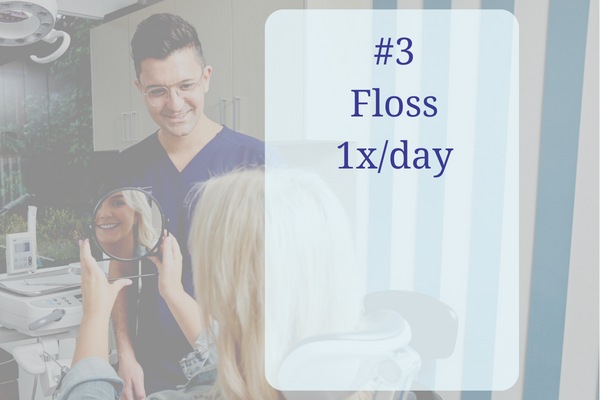
Flossing is just as important as brushing, so make sure you use dental floss or interdental brushes at least once a day. Flossing doesn’t just help remove food particles from between your teeth, it also helps stimulate the gums and lower inflammation.
As for flossing before or after brushing, the order really doesn’t matter, as long as you remember to do it at least once a day.
If you’re considering using mouthwash before or after flossing, mouthwash may give you nice, fresh breath, but it may not be helpful. The ingredients in mouthwashes can vary greatly, and some can be more harmful than good. It’s best to speak to your dentist about whether it is a necessary part of your oral care routine.
Step 4: Drink water and eat crunchy fruits and vegetables
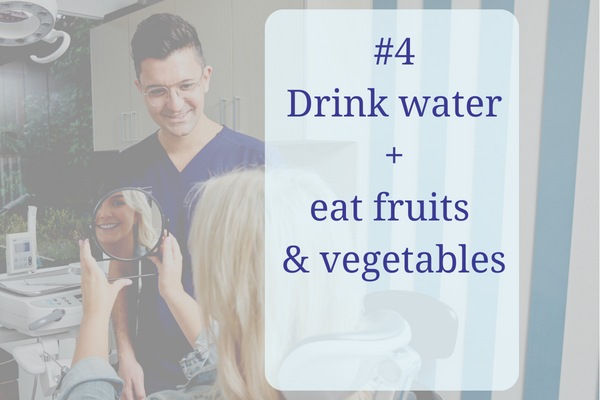
There’s no better beverage for your teeth than water. Limit your intake of acid-containing drinks which can wear down tooth enamel. Try drinking water throughout the day instead of beverages high in sugar such as soda or soft drink, or tea and coffee. It’s also a good idea to drink water after every meal.
As well as benefitting your overall wellness, great nutrition and a healthy diet consisting of a variety of foods such as crunchy fruits and vegetables will also get those jaw muscles working.
Step 5: Visit your dentist every 6 months
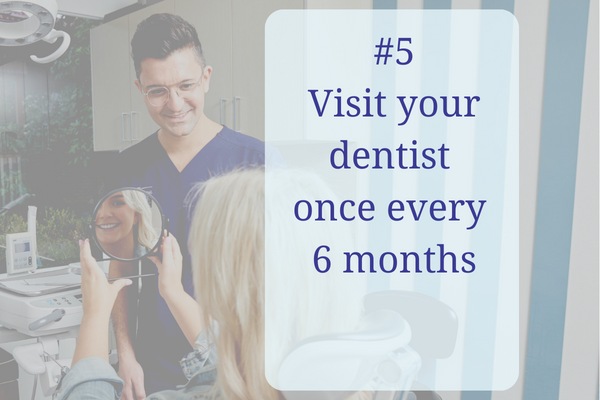
Don’t wait until you are experiencing pain or other problems to schedule dental visits. Making appointments twice a year for checkups, and professional cleanings will assist in avoiding the signs and symptoms of gum disease such as bleeding gums, swelling or infection.
Dentists don’t just look for cavities. They can also teach you how to care for your teeth, customise comprehensive treatment plans and establish firm routines to help you avoid more costly solutions down the track.
7 Benefits of good dental hygiene
- Good oral hygiene can lower your risk of heart disease. Numerous studies have concluded that people with gum disease, or periodontitis, have an increased risk of developing heart disease.
- You can help prevent more serious dental problems by treating minor dental issues, such as cavities and gingivitis.
- Making oral health care a priority sets a great example for your children and helps them form healthy dental habits which will last a lifetime.
- A healthy smile can lead to a healthier pregnancy and improved fertility. Gum disease can impact progesterone and estrogen and has been linked to low birth weights and premature births.
- Good oral hygiene reduces your risk of exacerbating diseases such as diabetes and heart disease.. Statistics show that untreated gum disease can lead to more serious health problems. This is why it is critical to understand the importance of brushing and flossing for overall health.
- Improve your self-confidence by putting your best smile forward. Addressing oral issues such as bad breath or stains on the teeth by seeing your dentist can even have positive implications for your mental health.
- You’ll keep your own teeth and live longer. Minimising tooth loss as you age is significantly correlated to greater life expectancy.
Good dental hygiene is important at every age!
Babies
It is important to start cleaning your baby’s teeth as soon as the first one appears. Choose a toothbrush with soft bristles designed for children under 2 years.
Toddlers and kids
Ideally, children should see a dentist by the age of two. Parents should continue to brush their children’s teeth until age 7 or 8. Choose toothbrushes of an appropriate size for their age.
Teens
Parents should continue to supervise the brushing of teeth until 10-12 years of age. It’s often around this age that parents seek advice from their dentist on orthodontics, as having straighter teeth can decrease the chances of tooth decay and gum disease.
Young adults
The rise of social media has many young adults seeking advice on whether they should whiten their teeth. However, teeth that are not perfectly white can still be very healthy. Speak to your dentist about teeth whitening if you have any questions or concerns about this.
As you age
As well as seeing a dentist for regular checkups, certain conditions throughout your life can impact your dental health. For example, dry mouth can be triggered by certain medications. As well as being uncomfortable, it raises the risk of gingivitis, tooth decay and mouth infections. It can also make it difficult to wear dentures. Make an appointment with your dentist to discuss possible treatments.
Sometimes fear or embarrassment can keep us from addressing our dental health. The caring staff at KB Village Dental realise there are many reasons people may put off visiting the dentist. However, they don’t judge, and will make you feel confident and comfortable whether it’s your first-ever visit to a dentist or just your first for a while.
Now you know how important your teeth are to your overall health, don’t wait until you are experiencing a problem such as pain or toothache to book an appointment. Come see us today!
